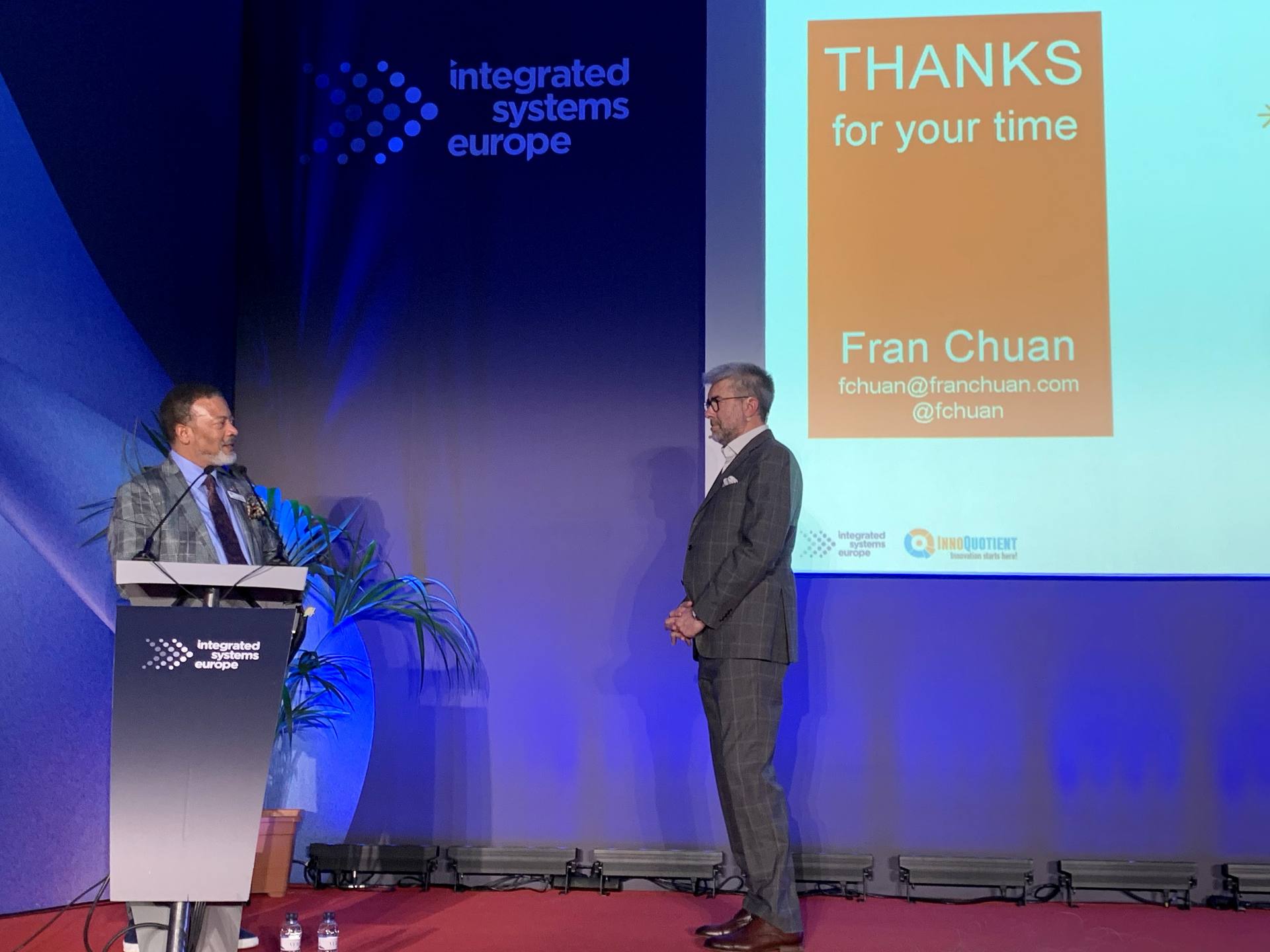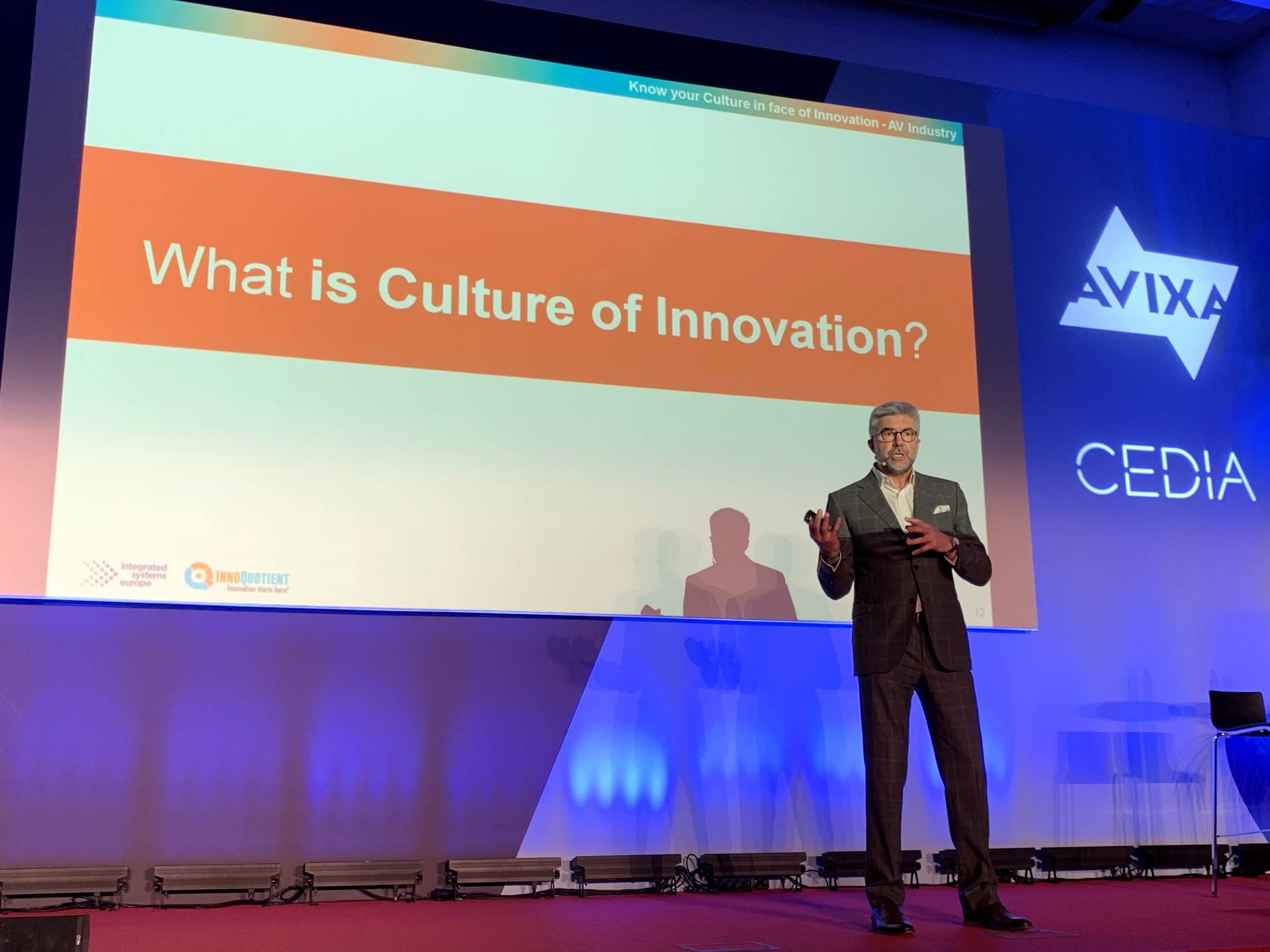This is one of the main conclusions of the InnoQuotient survey in which nearly 1,100 ISE 2023 attendees participated, analyzed by Professor Jay Rao and Fran Chuan and presented by the latter during his presentation at the congress.
Training in innovation is one of the unfinished business of the audiovisual industry. More than 53% of the sector acknowledges that they do not receive any training to innovate, but act by individual intuition, while innovation is a collective activity. "Organizations are allocating a lot of resources, but they don't seem to be stimulating among their members the four fundamental skills for innovation: curiosity, imagination, creativity and experimentation. They are more focused on technology", said Fran Chuan, co-founder and CEO of InnoQuotient, during his presentation at Integrated Systems Europe (ISE).

This is one of the main conclusions of the InnoQuotient survey in which nearly 1,100 attendees participated in the ISE 2023, the world's leading trade fair for the audiovisual industry and systems integration, which was held in Barcelona from January 31 to February 3 and broke attendance record with more than 58,000 people. During his presentation at the congress, Fran Chuan analyzed the results of the survey, whose sample was large enough to have a 95% reliability in the results, with a margin of error of 2.95%.
Thus, Chuan stressed that the audiovisual industry is very innovative compared to other sectors, but companies seem to confuse innovation with novelty and technological development and explained that organizations tend to compete in the market to, for example, have the largest screen and the smallest pixel, "but is that innovation? Is that what the market needs?" he asked. "To increase the likelihood of success of a novelty, one might ask what is the problem it solves? Or what need does it satisfy?" he added.
Similarly, the co-founder of InnoQuotient detailed that in the audiovisual industry "there is incredible talent", but it is not used optimally, since when opportunities are detected, "the data tells us that they do not launch to solve them". In addition, he pointed out that the sector does not "systematize innovation". "Although the industry is incredibly good at generating ideas, there is a bottleneck when it comes to turning these ideas into opportunities and that is a problem. The data tells us that opportunity spotting is a space with quite a bit of room for improvement", he stressed.

Scarcity and necessity stimulate innovation
In addition, Fran Chuan stressed that regions with fewer resources, such as Africa and Asia, have cultures that are more prone to innovation than those with more possibilities, such as Europe and North America. "Maybe we are too comfortable with the results we get. We don't have the need or the scarcity that stimulates curiosity, creativity and innovation", he commented.
According to the CEO of InnoQuotient, the same applies to the educational level of the audiovisual sector: the higher the level, the less innovative you are. "When you have a doctorate you incorporate a series of data and conclusions, which is extremely useful in intermediate and final stages of innovation processes, but when we talk about innovation we talk about the future, and the future is not and we have data. So what matters is how curious you are and how much you let your imagination run wild with options to answer your curiosity, not so much how smart or how well educated you are", explained Chuan, who stressed that "every innovation in history starts with an open question" and that, when we talk about innovation and the future, "we must act, collect data, analyze it and act again".
As for age, according to Fran Chuan, it does not play an important role in innovation, also within the audiovisual industry. "We tend to think that young people are more innovative than older people, but it's not true. Up to the age of 26 there is better data, but after that age there is no difference", he said.
Recommendations to improve innovation
To boost innovation in the audiovisual sector, the co-founder of InnoQuotient proposed a series of recommendations. The first of them is to create a "lingua franca", a common language on what we mean by innovation, not only in the sector but in each of the organizations.
He also insisted on the importance of knowing what the cultural accelerators and brakes are "to develop a true culture of innovation" and promote greater efficiency. "When you are more efficient, what you create are trends, and when you generate trends, talent is attracted to this area. Then, all of a sudden, you have more and more talent generating more and more trends efficiently", Chuan explained.
Another recommendation is to create interdepartmental teams, rather than working in silos or vertically, which facilitates collaboration between different areas of organizations when working together.
Finally, he encouraged organizations to conduct a survey to learn more about their culture, because "what your culture is like determines your results". In this sense, it is worth remembering that it is a unique tool to diagnose the culture before the challenge of developing a Culture of Innovation of organizations, based on a solid and robust model, developed by Professors Jay Rao and Joe
Weintraub of Babson College , statistically validated by the
Massachusetts Institute of Technology (MIT) and published in the MIT Sloan in 2013 .

 This is one of the main conclusions of the InnoQuotient survey in which nearly 1,100 attendees participated in the ISE 2023, the world's leading trade fair for the audiovisual industry and systems integration, which was held in Barcelona from January 31 to February 3 and broke attendance record with more than 58,000 people. During his presentation at the congress, Fran Chuan analyzed the results of the survey, whose sample was large enough to have a 95% reliability in the results, with a margin of error of 2.95%.
Thus, Chuan stressed that the audiovisual industry is very innovative compared to other sectors, but companies seem to confuse innovation with novelty and technological development and explained that organizations tend to compete in the market to, for example, have the largest screen and the smallest pixel, "but is that innovation? Is that what the market needs?" he asked. "To increase the likelihood of success of a novelty, one might ask what is the problem it solves? Or what need does it satisfy?" he added.
Similarly, the co-founder of InnoQuotient detailed that in the audiovisual industry "there is incredible talent", but it is not used optimally, since when opportunities are detected, "the data tells us that they do not launch to solve them". In addition, he pointed out that the sector does not "systematize innovation". "Although the industry is incredibly good at generating ideas, there is a bottleneck when it comes to turning these ideas into opportunities and that is a problem. The data tells us that opportunity spotting is a space with quite a bit of room for improvement", he stressed.
This is one of the main conclusions of the InnoQuotient survey in which nearly 1,100 attendees participated in the ISE 2023, the world's leading trade fair for the audiovisual industry and systems integration, which was held in Barcelona from January 31 to February 3 and broke attendance record with more than 58,000 people. During his presentation at the congress, Fran Chuan analyzed the results of the survey, whose sample was large enough to have a 95% reliability in the results, with a margin of error of 2.95%.
Thus, Chuan stressed that the audiovisual industry is very innovative compared to other sectors, but companies seem to confuse innovation with novelty and technological development and explained that organizations tend to compete in the market to, for example, have the largest screen and the smallest pixel, "but is that innovation? Is that what the market needs?" he asked. "To increase the likelihood of success of a novelty, one might ask what is the problem it solves? Or what need does it satisfy?" he added.
Similarly, the co-founder of InnoQuotient detailed that in the audiovisual industry "there is incredible talent", but it is not used optimally, since when opportunities are detected, "the data tells us that they do not launch to solve them". In addition, he pointed out that the sector does not "systematize innovation". "Although the industry is incredibly good at generating ideas, there is a bottleneck when it comes to turning these ideas into opportunities and that is a problem. The data tells us that opportunity spotting is a space with quite a bit of room for improvement", he stressed.

